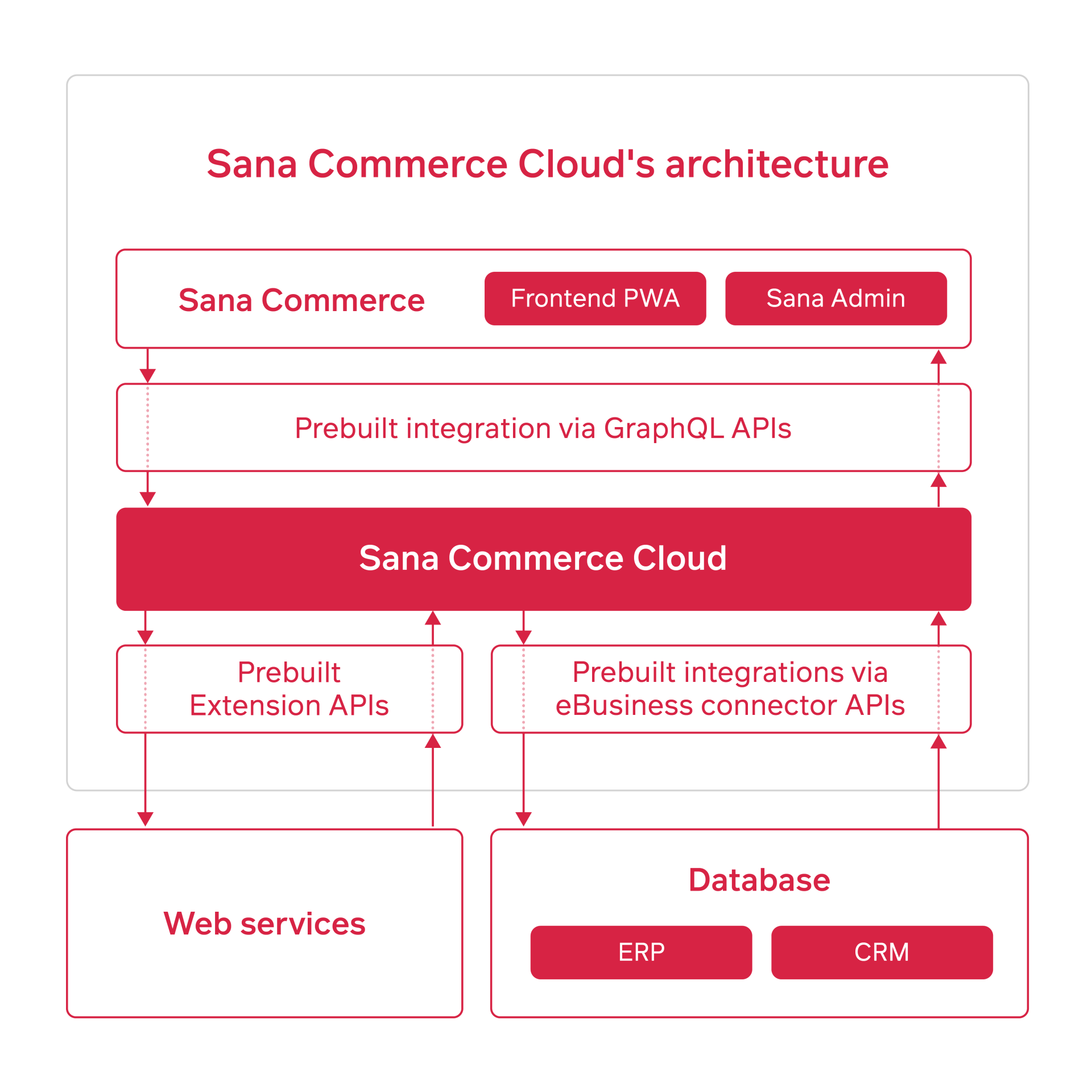

Buzzwords like “digital transformation” are everywhere, but when it comes to choosing an e-commerce platform, understanding the practical differences between solutions is key. Let’s take a closer look at Sana Commerce and Dynamicweb, focusing on what matters most for your business.
Sana Commerce vs. Dynamicweb: Key differences
Sana Commerce and Dynamicweb offer distinct approaches to e-commerce solutions, each with its own strengths and focuses.
Sana Commerce

- Real-time data syncs: Sana Commerce deeply integrates with your ERP system, leveraging its data and logic without the need for complex middleware or APIs. This streamlines operations and ensures data accuracy with real-time data syncing.
- Built for B2B complexity: Sana Commerce specializes in B2B e-commerce, offering robust out-of-the-box features tailored to complex B2B scenarios, such as intricate pricing structures and product configurations, as well as quotes and order adjustment flexibility.
- Built to scale: Multi-currency and multi-country operations allows Sana Commerce Cloud customers to scale and grow efficiently. Without robust functionalities for the same, Dynamicweb customers might struggle to expand in an operationally efficient manner.
Dynamicweb
- Closed Digital Experience Platform (DXP): Dynamicweb is an all-in-one platform encompassing e-commerce, marketing, CMS, and PIM, providing a comprehensive suite of digital tools.
- Relies on APIs for data transfer: While Dynamicweb positions itself as an integrated solution, its reliance on API-based integration differs significantly from Sana Commerce’s patented approach, which is embedded directly within ERP systems to enable seamless, real-time data synchronization. This reliance on APIs introduces potential challenges, including delays in inventory updates, inaccurate pricing information, and inefficiencies in customer order management. For businesses managing large product catalogs and complex ERP systems like Microsoft Dynamics AX, these disruptions can lead to difficulties in uploading and managing extensive product data, inability to ensure real-time updates, and inaccuracies in displaying product information. Such limitations highlight the importance of robust, ERP-native integration for maintaining operational efficiency and data accuracy.
- Flexible contracts: Dynamicweb offers flexible contracts, which can be useful for B2B organizations looking to trial a product before committing to their tooling. For those viewing e-commerce as a long-term investment and seeking a partner equally invested in growing their platform, Sana Commerce offers three packages that offer different levels of service.
The B2B use case: Sana Commerce Cloud vs Dynamicweb
As we’ve already briefly touched on, one factor about the Dynamicweb solution to keep in mind is: because the solution is not truly ERP-integrated, providing complex ERP functionality (particularly for a B2B use case) often requires a highly customized project beyond what the vendor’s out-of-the-box (OOTB) offering and price may have looked like at first glance.
Consider how this may impact the scope of your e-commerce project, your implementation timeline and your budget. Dynamicweb may be the right choice for B2C-focused businesses who have a simple requirements list for their e-commerce solution, or are perhaps trying out their first web store and looking for something foundational to get started.
This may not be the case if you’re looking for something more robust, or if you’re aware of complex pricing, product configurations, etc. that will require a heavily customized B2B e-commerce project.
To share a brief example:
We recently spoke to a prospective customer who once ran on Dynamicweb. They shared that after a two-year e-commerce implementation process, they found that they had to go back and add more and more customizations to their requirements list any time they wanted new functionality on the web (even if that functionality already existed in their ERP).
Why?
Because while about 65% of their requirements were included as part of the standard OOTB Dynamicweb solution, the other 35% were not. In the short term, this led to extended timelines and broader project scope.
However, it’s easy to see how this challenge (especially if you select an e-commerce solution that’s not the right fit for your particular business model) would become exponentially more difficult as this business attempted to scale or expand with this kind of e-commerce solution at the core of its digital strategy.
Leading in innovation and integration
Sana Commerce Cloud is among the first to be built on a React.js framework. It has a more extensive range of out of box capabilities than any Sana Commerce product yet. And it’s the very first to leverage single-page applications (SPAs) for a B2B use case, improving the buying experience and boosting performance. It offers analytics, CMS, and marketing capabilities on par with Dynamicweb, plus much more comprehensive integration and more innovative functionality.
What’s more, choosing Sana Commerce Cloud means signing up for automatic upgrades on a bi-weekly basis. Our product teams are dedicated to keeping our product at the forefront of B2B commerce technology, which means you have a product that is future-facing, and future-ready.
Choosing the right fit
While both platforms offer valuable features, the right choice depends on your specific needs and priorities. If seamless ERP integration and a focus on B2B functionality are paramount, Sana Commerce might be a better fit.
However, if you seek a comprehensive DXP with a strong partner ecosystem, Dynamicweb could be the ideal choice.
Remember, the best e-commerce platform is the one that aligns with your business goals and empowers you to achieve success in the digital landscape.
Reasons to choose Sana Commerce Cloud
- Superior integration capabilities: Seamlessly connect your e-commerce platform with your ERP system for streamlined operations and accurate data.
- Faster deployment: Get your online store up and running quickly, allowing you to reach your customers sooner.
- Support for international expansion: Easily manage multiple storefronts, currencies, and languages to cater to your global customer base.
- Clear vision for growth: Benefit from a platform designed to scale and adapt as your business evolves.
- Robust, cloud-based solution: Leverage a modern, secure platform that aligns with your existing technology investments.
- Sustainable platform enhancements: Enjoy regular updates and improvements to keep your e-commerce platform at the forefront of technology.
- Partnership-driven approach: Collaborate with Sana Commerce as a trusted partner to tailor the platform to your unique needs.
Making your decision
Choosing the right e-commerce platform is a strategic investment, and while Dynamicweb might seem appealing due to potentially lower upfront costs, it’s crucial to consider the long-term implications. Integration issues, common with platforms lacking deep ERP integration, can disrupt your operations and hinder your ability to scale effectively.
Sana Commerce Cloud (SCC) stands out with its seamless ERP integration capabilities. This eliminates the risk of costly and time-consuming integration challenges, ensuring smooth, efficient, and uninterrupted business operations. SCC’s pre-built integration with your ERP system translates to faster time-to-market and a more agile e-commerce solution that can adapt to your growing needs.
Investing in SCC means investing in a scalable, future-proof solution that can support your business’s growth ambitions. Remember, the true value of an e-commerce platform lies in its ability to deliver long-term benefits, not just short-term cost savings.

Watch Sana Commerce Cloud in action.
Speak to one of our experts today.



